Support strong Canadian climate journalism for 2025
“I recognize you’re here with open hearts and open minds, and I have heavy truths. One of those truths is that most people aren’t acting until it directly affects them.
And how many women did we lose in that time? How much land did we lose in that time?”
Musqueam land protector Audrey Siegl looked out at a sea of thousands of protestors gathered in front of the Vancouver Art Gallery on Oct. 25 as she asked them these hard questions. The crowd had gathered en masse for the chance to greet Greta Thunberg, the famous 16-year-old Swedish climate activist making her way across North America.
“I am grateful you are here. But I wonder, where were you 50 years ago, 10 years ago? Where were your ancestors?” she asked.
Siegl said she supports Thunberg’s work, but she wants the public to give credit where credit is due and recognize others who have been protesting government inaction on climate change and land degradation for years.
“I am grateful for Greta to be here. We put medicine down, and we said prayers, not just for her safety, but for her success. But we also have Ta’kaiya Blaney. We have Autumn Peltier. And we have countless other Indigenous youth who have also been doing this work, because they are the most negatively impacted,” she said.

At 8-years-old, Ta’Kaiya Blaney, from Tla'Amin First Nation, wrote her first protest song. Her song was against the now-abandoned Northern Gateway pipeline. Since then, she has spoken and sung at the UN and events around the world. Autumn Peltier from Wikwemikong First Nation is famous for her activism to protect clean water. She attracted attention at 12 years old for confronting Justin Trudeau in 2017, telling him “I am very unhappy with the decisions you’ve made,” after he approved the Trans Mountain expansion project and the Enbridge Line 3 replacement project. She also addressed the UN last year.
The thousands gathered on Friday came out for a weekly school strike led by a Vancouver group called Sustainabiliteens, inspired by Thunberg who began striking from school by herself. That first solo strike was just over a year ago. Now, she’s joined by millions of students around the world every Friday in the movement she’s called “Fridays for Future.”
This Friday Vancouver was the epicenter of that strike movement. The crowds rallied and marched through the streets, halting traffic and chanting slogans like “we are unstoppable, another world is possible.”
Thunberg was the star draw on Friday, but Indigenous leaders were key speakers and formed the front line of the march.
Grand Chief Stewart Phillip, who has been fighting for the environment for over 40 years, was in the lead with his wife Joan Phillip. He was surrounded by others leaders including Secwepemc Kukpi7 Judy Wilson, Wet’suwet’en Hereditary Chief Na'Moks of the Tsayu Clan, Cedar George-Parker from Tsleil-Waututh, and Siegl.
Other notable attendees included David Suzuki, Elizabeth May, and Jody Wilson-Raybould.
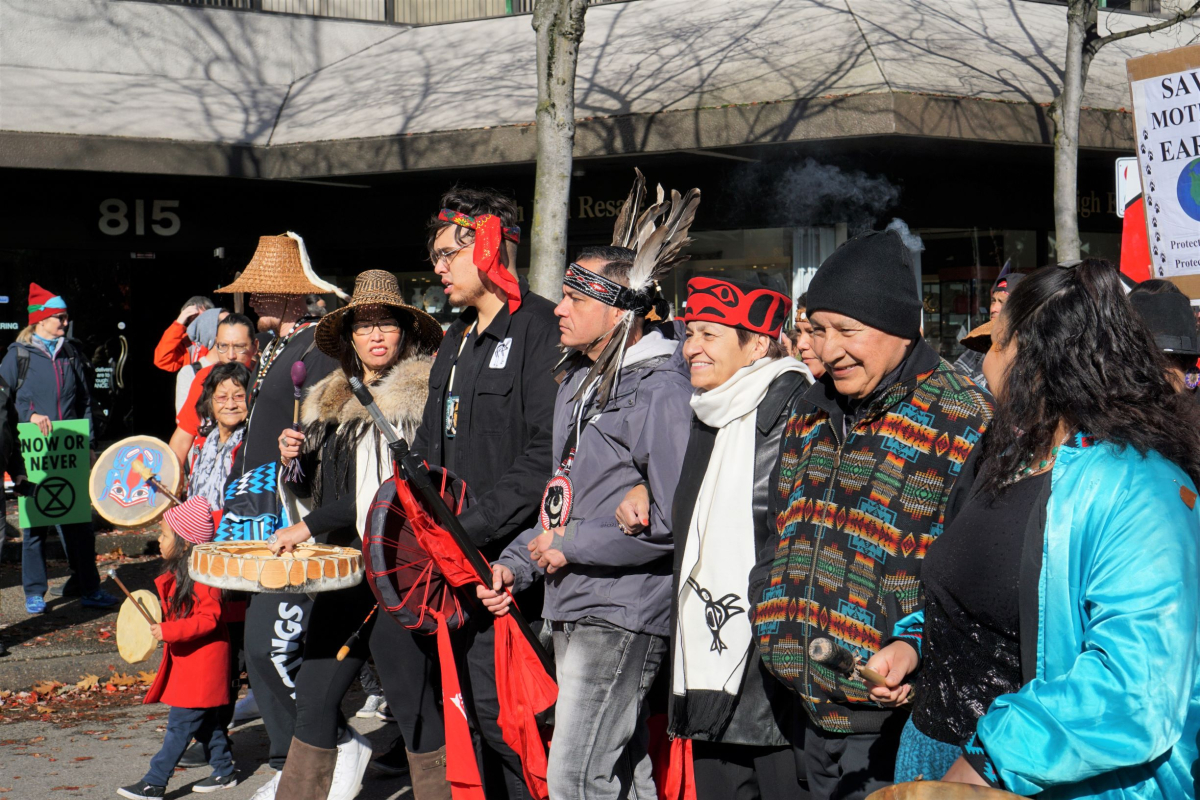
Thunberg lies low in the crowd
Thunberg marched further back in the crowd. The 16-year old, seemingly trying to be unobtrusive, was surrounded by a crew of volunteers fending off an eager crowd.
Throughout the event, which attracted upwards of 10,000 people, many speakers emphasized giving a voice to those who often aren’t heard, from Indigenous youth in Canada to people in third world countries who are most at risk from the effects of climate change like droughts, wildfires and sea level rise.
As Thunberg came on stage to give her speech the mic picked up the sound of Grand Chief Phillip saying “I’ve got to have a hug.”
“Thank you for everything you do,” he said. “You too,” she replied.
“We are just so blessed to have you,” he said, which she humbly refuted with a quiet “no!”
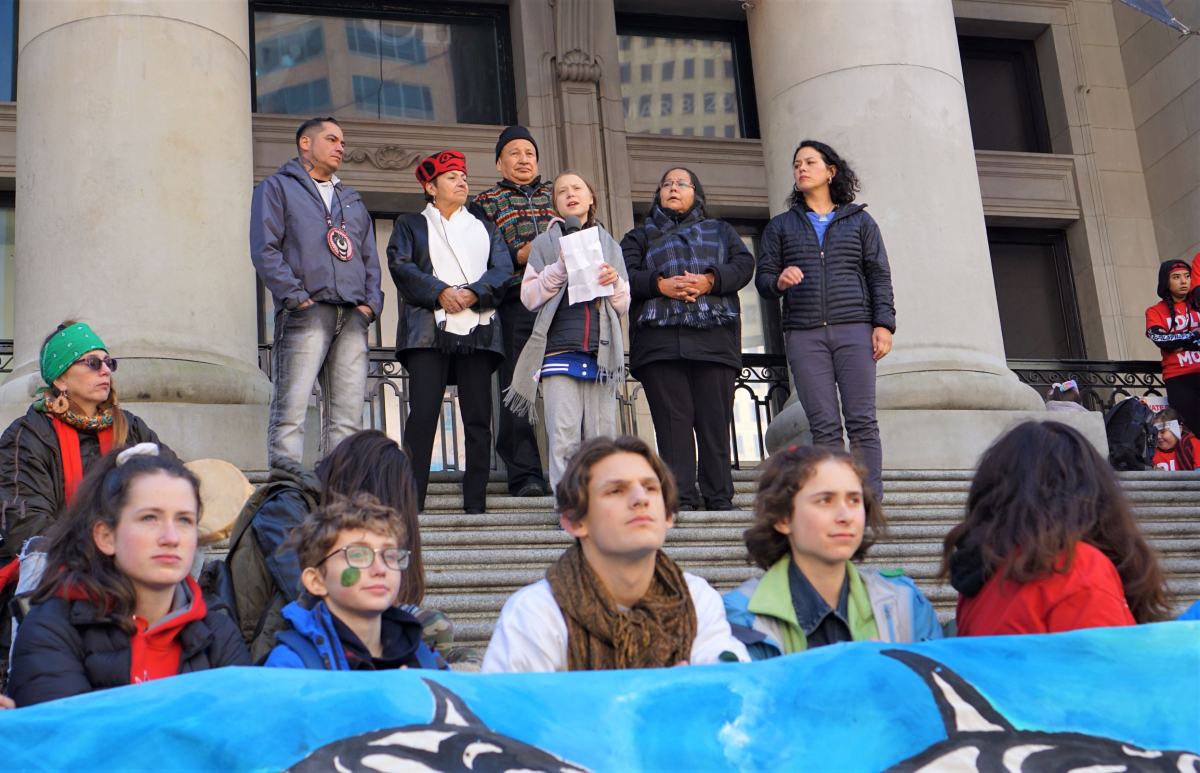
In her speech Thunberg quoted David Suzuki’s daughter, Severn Cullis-Suzuki, who, at 12-years-old, addressed the UN Earth Summit in Rio de Janeiro in 1992 and told the international group that her future means more than “an election or a few points on the stock market.”
“Severn told the world everything the world needed to know 27 years ago,” Thunberg said. "If people had listened back then, the world would be a completely different place than it is today. But the world ignored her, and the world continues to choose to look away from this crisis even today.”
Crazienish, who helped found Idle No More in Vancouver, said "it's sad" people haven't rallied for Indigenous leaders or others like David Suzuki, but at the same time, "It's nice to be able to see there're more and more people who are becoming aware".
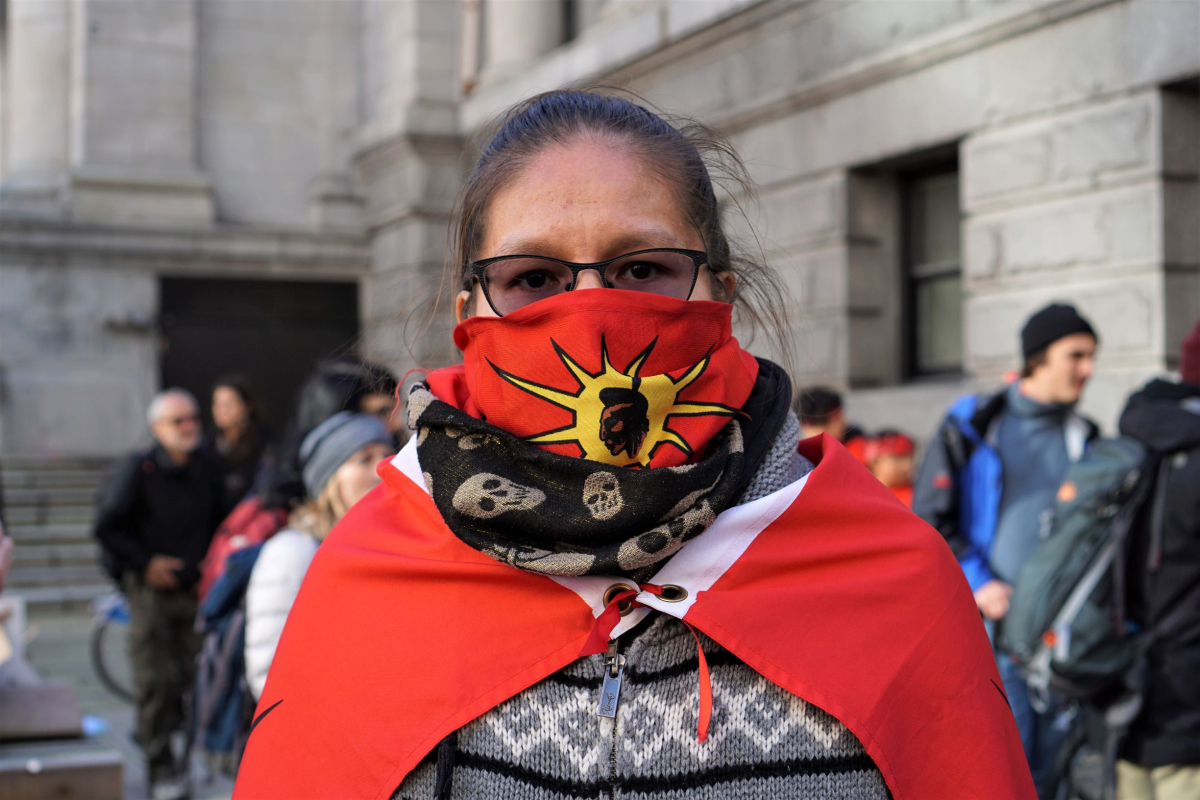
Unable to march at home, Chileans raise their flags
On the same day 10,000 people gathered in Vancouver, an historic 1 million protestors gathered in Santiago, Chile. The peaceful march followed protests in the country over affordability and inequality. The state crushed those protests with a strong police and military response. Chileans in Vancouver joined Friday's march to bring awareness, waving Chile's national flag and the Indigenous flag of the Mapuche People who live in Chile and Argentina.
José Velasco, from Chile, has lived in Vancouver for two years.
"There're people that have been killed. There're people missing. And right now, today, at this moment, there's the biggest march in the history of Chile in Santiago," he said. "So we said, we have to come and let people know that something's going on."
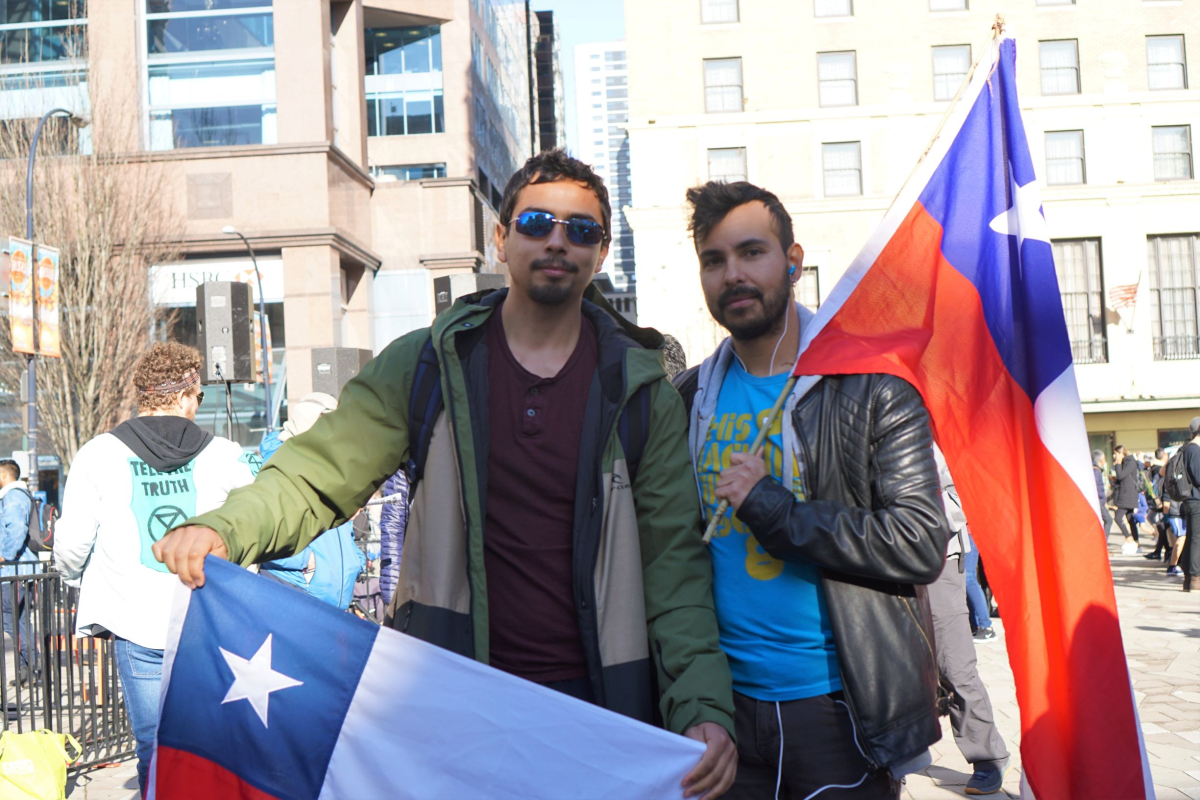
He said last weekend when violence on the streets peaked and Santiago was put under a state of emergency, he "felt like crap."
"The worst thing that happened to me last weekend is that it rained," he said.
The government says at least 15 people have died since the protests broke out almost two weeks ago, and thousands more have been detained. But after the peaceful march on Friday, the president Sebastian Piñera called for the resignation of his cabinet. He also raised the minimum wage and pensions, but people took to the street again the next day.
Some more photos from Friday's march.

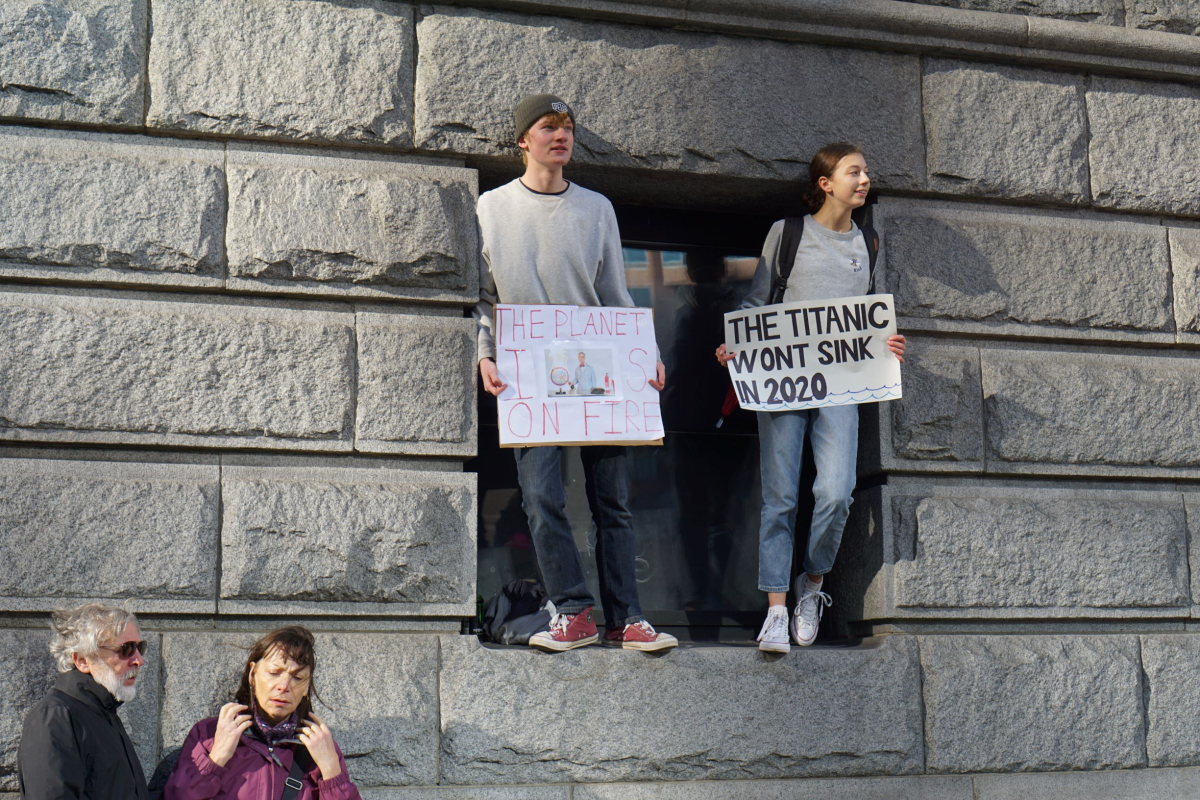









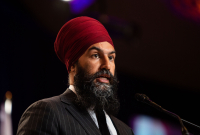
Comments
These are important point to highlight from the event. I am Metis and a grandmother. I was there with my grandchildren who were not more than toddlers 10 years ago and I have been standing at that very spot for years for indigenous rights, reconciliation, against pipeline and evicting open pen fish farms. I have to say I admired the role that indigenous people took in that event - and the extent to which their allies stood them up. I am happy she made those statements, they need to be heard - that we have among us both young and old indigenous leaders. For some, it will not be easy to receive this message but I urge them to simple raise your hands and receive it. It must be received within the context of our nations history and some of them won't have all the information. Forbearance means not demanding something (such as a debt, right, or obligation) that is due. Indigenous people have been forbearing for a long time. Now, as they stand, we must move aside and allow them to bring with them some of the hurt that comes with their strength, and let them speak and act.